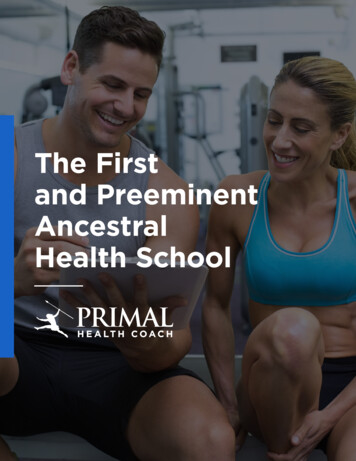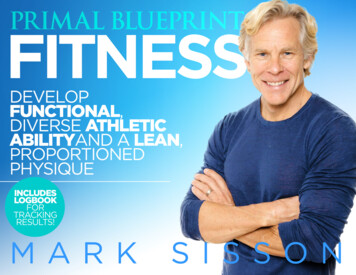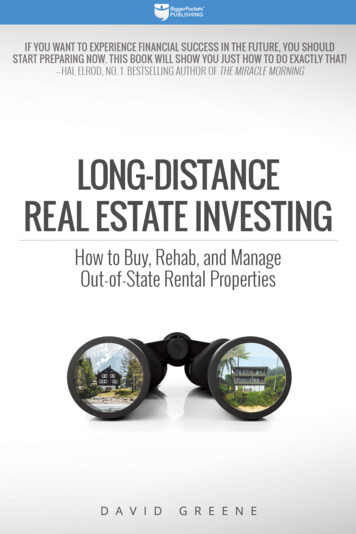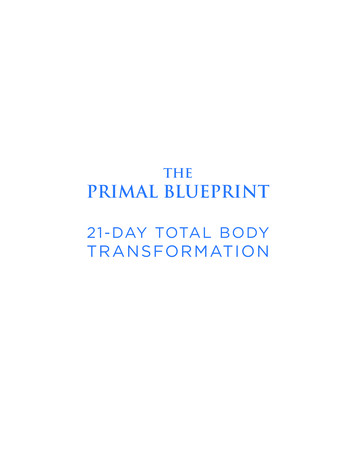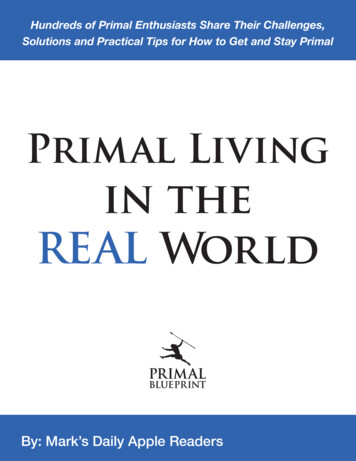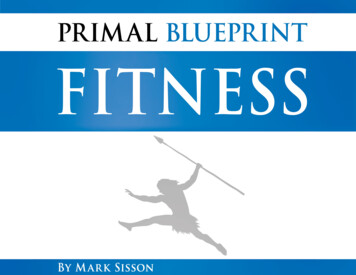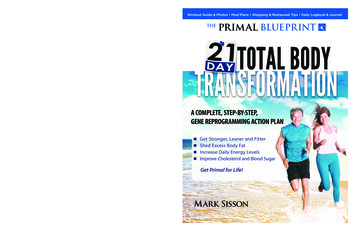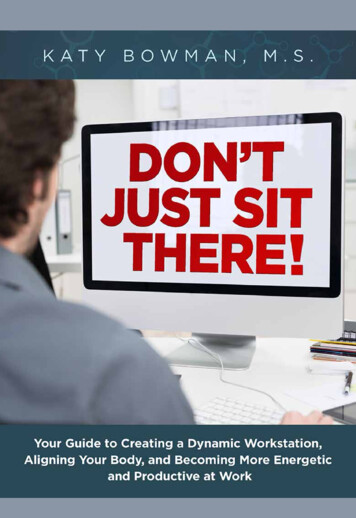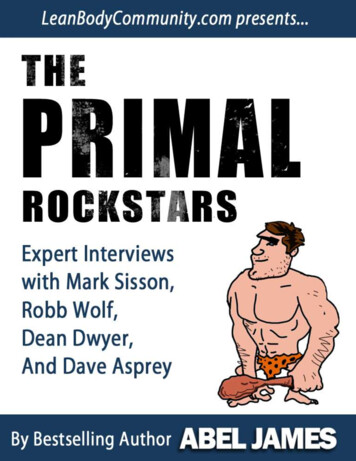
Transcription
Visit LeanBodyCommunity.com for more!
About the AuthorAbel James is a bestselling author, consultant, musician, and health crusader.As host of the wildly-popular Fat-Burning Man Show and author of the best-selling Intro to the PaleoDiet and the LeanBody Lifestyle, Abel brings Paleo, ancestral, and real food principles to themainstream. In addition, Abel unveils deceptive marketing practices, exposes misleading corporatepropaganda, and highlights powerful special interests that have accelerated the worldwide obesityepidemic and health crisis.Abel has conducted research studies, presentations, and guest lectures in North America, Europe, SouthAmerica, Africa and Asia for Fortune 500 companies, the Federal Government, and Ivy LeagueInstitutions. Also a professional musician and singer-songwriter, Abel James has toured North Americaand Europe as the bandleader of several groups including the Dartmouth Aires who were recentlyawarded Silver on NBC’s “The Sing-Off.”A tireless researcher, Abel James completed high school and college in a total of just six years.Distinguished as Valedictorian at New Hampton School, he earned his Artium Baccalaureatus fromDartmouth College and graduated as a Senior Fellow with Honors concentrating in Psychological andBrain Sciences.Abel recently published “The Musical Brain,” a best-selling exploration into the biological andevolutionary basis of the faculty of music, language, and the brain.Hailing from the frosty backwoods of Center Harbor, New Hampshire, Abel now calls Austin, Texashome.Visit LeanBodyCommunity.com for more!
Interview with Mark SissonAuthor of the Primal Blueprint and Mark’s DailyAppleHey, there! Welcome to the Fat Burning Man Show. I’m your host, Abel James, and thanks somuch for stopping by. Today I’m stoked to be here with one of my favorite authors/bloggers/personalities—the Grok man himself, Mr. Mark Sisson.Mark’s a former running and triathlon phenom, best-selling author of the Primal Blueprint andother books, founder of Mark’s Daily Apple, one of the most popular health websites in theworld, and a bone fide cool dude. We had a blast hanging out and chatting last month atPaleoFX and I was totally psyched when he said he’d love to sit down with me and let me pickhis brain.But before we get to the show, I’m going to say (write) a few words America is in the midst of a health and obesity epidemic and it’s getting worse. The collectivehealth of this country is falling off a cliff. Average Joes, grandmas, children – no one isbeing spared, and I am extremely passionate about reversing this trend and helping as manypeople I can. We’re all in this together, and while we may not be 100% correct about everything,Visit LeanBodyCommunity.com for more!
I believe with iron-clad conviction that we have an answer that has the potential ofimproving the lives of millions of people.Through his blog, best-selling books, and various other endeavors, Mark has stoked the fire.The movement is accelerating; I can’t think of a better time to interview a seasoned veteran whohas been living an evolutionarily-informed life for decades.So in our interview, Mark and I cover the following: Why you shouldn’t run a marathon to prove to your ex-girlfriend that you’re worthy How to build lean muscle as a string-bean ectomorph Why you shouldn’t throw yams at someone who wants to train while keto-adapting And Mark accidentally spills the beans about safe starches—sorry Mark! And, of course, we talk about how we’re going to beat out Jillian Michaels and take over theworldAlright, let’s go hang out with Mark!--Abel: Hey, Mark, thanks so much for joining us!Mark: Hey, Abel, it’s great to be here! Thanks for having me.Abel: Awesome. I wanted to share with you Mark, on my Facebook fan page a guy named BillBrennan said “I grew up in a small college town where Mark Sisson was in college writingphenom.I was in high school and definitely remember his budding fame at the time. He, like yourself andothers in the Paleo/Primal movement, have such interesting stories about how you gotinvolved.” So, Mark, your fame, even from your college days, precedes you! But for others outthere who don’t know it, how did you get into all of this Primal/Paleo madness?Mark: “Well, like anything, I think it, for me, was an evolution—a microevolution. I was a runnerin college, a distance athlete, and trying to increase my performance, improve my performancein any way that was legally possible, which included extra miles, running as many miles as Icould, trying to manipulate my diet to get the most, extract the most number of miles out of—miles “per gallon” or per calorie; trying to improve my recovery time. So I’ve always beeninterested in that aspect of human performance at the elite level. But, as so often happens toVisit LeanBodyCommunity.com for more!
people of my generation, we did too much. We did too much, too soon. We didn’t know howbad—how devastating—running might be for the average person. And I was pretty much anaverage person. I don’t have a lot of genetic legacy in terms of being an elite athlete. I was, youknow, sort of middle-of-the-road, maybe toward the elite end but certainly not in the elitecategory if you look at my raw numbers, my DO2 max, for instance.Abel: Right.Mark: I just worked really, really hard. Ultimately, I think I worked too hard, and the wheels felloff, and went in my mid-20’s, and I started to—as I was running faster and faster and gainingnotoriety and starting to win some races and qualify for the US Olympic trials, the more fit (in astrict time sense) I became, the sicker I became. And I started to get upper-respiratory tractinfections, I started to get injured. So my career ended very early because of all of these missteps. And I wound up taking a real hard look at where I was in my life and having come intothis initially with the idea that I wanted to be healthy and fit and all the things that people want. Isort of lost sight of that in the pursuit of performance. So I kind of back-tracked and said, “Okay,what is it going to take to be lean, fit, strong, happy, healthy—all the things I want—withouthaving to sacrifice so much, without having to tear my body apart and miss out on all the goodtimes that people my age tend to experience.Abel: Yeah Mark: I mean, when I was an endurance athlete, I don’t think I stayed up past 11 more than acouple of times a year because I was just so fried from the training. So all these thingsconspired to make me re-examine where I was, and the first thing that I realized is that I did nothave to train so hard to maintain a decent body composition. The next thing that I realized wasthat I’d been sacrificing my health in terms of how little fat I was consuming. And when I startedeating more and more fat in my diet, it not only did not negatively impact me, it positivelyimpacted me.Abel: Funny how that works!Mark: So increasing the fat in my diet all through this time I was already into evolution and hadbeen interested in it in college. In my first book that I wrote in ’82 (came out in ’83), The WorldTrack and Training Book. So that’s been out almost 30 years. I really call upon evolution as asort of guiding force in terms of extracting performance as an athlete training. You have to lookto evolution. So all of these things combined. Over the years I wound up pulling together myVisit LeanBodyCommunity.com for more!
ideas on training, my ideas on diet, including increasing the amount of fat. And the last piece tofall in place was getting rid of grains. I really held on to my right to eat grains, dammit!Abel: When did that change?Mark: About 11 years ago now. And that was just me finally taking a stance, saying, “Look, I’vedone all this research that shows that grains are pretty bad for you. Maybe I’ll do my own 30-dayexperiment.” And I did. And it was transformative. All the things that we talk about today—thearthritis in my fingers—that I thought was just going to be with me for the rest of my life—disappeared in those 30 days. The irritable bowel syndrome I had my whole life: thatdisappeared. Some lingering sinus stuff I used to get at the end of hay fever season: thatdisappeared. It was so crystal-clear to me that grains were at the root of a lot of things that I hadassumed were just natural effects of me getting older. You gotta dig that I was already 47, 48years old when I finally adopted this final aspect of the primal/paleo way.Abel: Yeah! And you were kind of a lone wolf at the time, right? Just experimenting on yourselffor the most part?Mark: Certainly! I mean, I was doing research for the last 20 years. Most of what I’d done overthe course of a day was to read books, read studies and to figure out, “Where do I fit on thisspectrum of people who are seeing in research or discovering through their own methods?” AndI kinda had to carve out a path that worked for me. But there’s nothing new that I’ve puttogether—I’m the first one to admit.Abel: Sure.Mark: I mean, all the stuff that I talk about, people have talked about before I started talkingabout it. That’s for sure. I just sort of borrowed bits and pieces from people like [Loren] Cordainand Jack [Kruse] and Melvin Konner and Boyd Eaton and [Nell] Stephenson and going wayback. And my mission was always to put this in a story that the average person couldunderstand and go, “Wow! Now I get how my body works.”So my mission has always been to educate people—and do so in a way that makes use of thescience for sure—but also tries to describe it in ways that are understandable and easy to getand, at times, humorous I think.Abel: Yeah! Definitely. And I think you’ve done all that exceptionally well. You know, theaverage person certainly isn’t going to be slogging through medical journals and that sort ofthing. And they shouldn’t have to, ya know? Like, living this sort of thing, this sort of lifestyleVisit LeanBodyCommunity.com for more!
doesn’t necessitate that. So I think one of the things I love about your blog is that it is veryreadable and entertaining as well.Mark: Well thank you! And you know, we make a big effort to continually put new spins on thekinds of things that we’ve been talking about. Because, you know, this blog has been inexistence almost six years now. And when I started it, I said, “Well, I’ll writes something everyday for a year, and then I’ll run out of things to write, and that’ll be the end of that.” Well, all it didwas open up tremendous new tangents and possibilities of things to discuss. This is sort ofwhat’s led to my new book, which is coming out in a few months, “The Primal Connection,”which takes the whole Primal Blueprint concepts of the expectations of our hunter-gatherergenes, and goes far beyond diet and exercise and looks at social structure, work situations,family situations and tries to paint a picture that draws on anthropology and evolutionary biologyand science, but then provide practical insights into how to get the most out of one’s life.Abel: Yeah, I’m really excited about that, and hopefully we can talk a little more about that later.But getting back to what you said about your genetics and body composition: so now obviouslyyou’re jacked if anyone’s seen your pictures or met you in person, but I would imagine when youwere running a hundred miles per week or doing triathlons, you couldn’t really support thatmuscle mass.Mark: It’s funny, because people in the old days would say that I was pretty muscular for arunner.Abel: Right.Mark: So when I was a marathoner and I weighed between 142 and 145, everyone else aroundme weight 125 to 135, and I’m 5’10”. You know, I weigh 20 lbs more than that today, and I havethe same body fat. So I really chewed up all my lean tissue, especially my upper body tissue,despite the fact that I lifted weights a lot. I was really into lifting to the extent that it was possibleat the end of a 20-mile run some days. But I was very aware that lifting weights was going to besomehow beneficial even to an endurance athlete’s overall career and criteria. But, yeah, withthe diet and the chronic cardio that I was doing, it was almost impossible to keep any leanmuscle on besides what I required in my legs and, you know, lower body to propel myself.Abel: Yeah, I remember when I was running marathons, I was 147, 148. And now I’m wellabove 160, and I have a lower body fat at this point. And it just looks and feels incrediblydifferent. And it’s just mostly the way that it feels. It just feels so much more balanced this way.But I was wondering, Mark, what’s your natural body type? You know, all other things equal Visit LeanBodyCommunity.com for more!
Mark: Nah, I’m a skinny guy. I’m an ectomorph type. You know, my dad was 5’ 11”, 145 lbs formost of his life. He’s still alive, he’s gained a little bit of weight. But well into his 50’s he wasunder 150 lbs. I have two brothers who are about my height, and one of them probably weighsabout 135 to 145. So I come from lean stock, as they say. You know, just skinny, to the extentthat you say, “What was the selection process to become a runner?” Well, it’s because I couldn’tdo anything else! You know, I wasn’t big enough to play football and survive that. Maine was abig hockey state and I just got beat up enough as a 10-year-old and 11-year-old playing hockeythat I realized I didn’t want to do that. So I kind of naturally gravitated towards running, since Ilived two miles from school and I used to run to and from school just as a means oftransportation.Abel: Interesting. So being a hard gainer, what does your weight routine look like?Mark: Well now It’s kinda funny. I do as little as possible to maintain. Because I’m gonna be 59in July, and you realize, at some point, you recognize that, despite the fact that I have access toall the top information and the best diet, there is a decline in performance as you age, and I didhit my peak at 35, and now I’m just trying to just preserve and maintain. The main focus in mytraining is to not get injured because I like to play. So I like to spend a lot of time playing Frisbeeor hiking or paddling or snowboarding. And I like to do those without injury. So most of mytraining is contemplated to support the sorts of movement that would be required in these otherpursuits that I just described. So I only lift twice a week. I lift pretty much full bodyweight stuff.Sometimes weighted with a weight vest, but typically its pull-ups, pushups, dips, squats, lunges,pull-downs; you know, just upright rows, maybe. I do some ballistics stuff, box jumps, stadiumstairs, sprints and things like that.Abel: Cool! Shifting gears a little bit, right now actually I’m writing a short book on fasting withone of my researchers, and we spoke a little bit about this before and I know you just wrote abunch of posts about it, so I wanted to make sure we covered it, but others would be interestedto hear: how do you do intermittent fasting? How is it incorporated into your life? I know that,philosophically, it’s not really a strict schedule, from what we talked about before.Mark: Yeah, it’s not a strict schedule. On the other hand, I do, many days, have a compressedeating window. I will eat at 7 o’clock at night and then I won’t eat again until 1:30 or 2 o’clock thenext day. So I’ve got maybe a 6-hour window from 1 to 7 that I’ll maybe eat two meals, and thenI won’t eat again. But I almost don’t even call that intermittent fasting. And I don’t know why, Imean, it fits that category. I just started to kind of look at that a while ago and, well, I tend to tellpeople that I only intermittently fast when I travel, when I know I’m gonna be on a plane that willVisit LeanBodyCommunity.com for more!
have crappy food at best or won’t be serving any food. I’ll be rushing through airports and thingslike that. Then it’s easy to just say “okay, I’m trained for this, I know how to burn fat.” Yeah, I usethis opportunity to not eat and stay focused. Listen, when you and I were hanging out in Austin,at Paleo FX. There was an example of where I went from 7 o’clock one night to 9 o’clock thenext night because of travel.Abel: Oh, wow!Mark: So when we went to that barbecue place for dinner that night, that was a ways after I hadpreviously eaten. But that was fine. I’m trained to do that. I just don’t because I like to eat, Idon’t force myself to fast on a schedule. But between the compressed eating window and theoccasional travel—you know I just got back from Africa—Abel: Yeah, that sounds awesome! How was that, by the way?Mark: Oh, it was fantastic, yeah. But it there was a 34-hour door-to-door travel coming back.And it’s a good example of choosing to intermittently fast when it’s forced upon you just the wayit was when our ancestors were forced to fast. They would never choose to fast, but when it wasforced upon them, they did very well.Abel: Shifting gears a little bit again, I want to talk about your site a bit. I know personally youhave a lot of strong opinions. But you’re pretty diplomatic on Mark’s Daily Apple and in yourbooks. And that’s one of the things I really like about it [the site]. But as I mentioned in one ofmy last blog posts, you’re one of the only blogs I comment on, despite the fact that I read mostof the other ones because I think you foster a really positive community and environment. Arethere any points when you feel like there isn’t a good compromise? What’s the good and thebad of walking the middle road there?Mark: Well, that’s a good point. Because it’s come up recently that, at some point, as thesefringe pursuits begin to emerge, some of which run counter to what I’ve espoused over theyears, I may have to take a stance on it. A good example that’s been talked about quite a bit inthe popular Paleo press for the past few months is ‘safe starches.’ You know, I’m pretty clearthat while there are some safe starches, it’s not a route that I would recommend going. It’s notone I would want to choose to do. My take on glucose in general is that the less glucose youcan consume in a lifetime, the better off you are.Abel: Yeah.Mark: And that doesn’t mean that you can’t have a baked potato or a sweet potato every oncein a while, or have a day of 350 grams of carbs if that’s what you want to do—these are all justVisit LeanBodyCommunity.com for more!
choices. But my choice is to reduce the amount of glucose I take in in the form of exogenouscarbohydrate. And as such, I’m not a big fan of the concept of ‘safe starches.’ I get all the carbsI need from the vegetables and some fruit that I consume, and I consume, and I consume agood amount of vegetables, so it’s not like I’m in a deprivated state.Abel: Right.Mark: So I really don’t see a need to supplement my glucose production or my carbohydrateintake with safe starches. That’s just one example of an area where I felt, well, and see! NowI’ve done it! You’ve made me do it, Abel!Abel: [laughs] Sorry, Mark!Mark: You’ve made me come out and take a position where I would normally be this diplomaticguy standing in a line. But at some point—and we’ve had this discussion over the years with mystaff—which is the forum. We had a Mark’s Daily Apple forum and it got way out of hand. It gotvery contentious early on, and I shut it down for two years.Abel: Oh, did you really?Mark: Yeah. And at some point, it seemed like a good idea to bring it back and to do a bit morein terms of moderation. So I brought the forum back, and now it’s probably the most popularforum in the Paleosphere on the Internet. And I stay out of it. And I do so on purpose so I allowpeople to kind of air their stuff. And it’s still moderated, I have staff—worker bees—who willmoderate because there’s a crapload of spam that filters in there and we have to kind of toe theline at some point. But I also allow more people to voice contentious opinions than other forumsmight. But that was the compromise that I made to open the forum back up rather than have allthat stuff happening on the comments section of the main Mark’s Daily Apple site.Abel: Right, right—and that makes sense.Mark: And the other thing is that, you know, some of these guys have their blogs and they’reanswering every comment and, you know, if I answered every comment, I wouldn’t be able towrite the content that I write. I don’t have the time or the energy to answer every comment. Iappreciate the comments. Believe me, I read them all, I check them all out. But it’s very rare thatI’ll even answer or respond to a comment, particularly to old post. Sometimes comments comein from a post I wrote a year or two ago, and you know, that boat has already sailed.Abel: Yeah, and I remember you talking about that when we were in Austin, about how a lot ofyour traffic does come to those posts you wrote two and a half years ago, so if someone isVisit LeanBodyCommunity.com for more!
commenting on that, it would be tough to kind of piece-meal respond to those comments inperpetuity.Mark: Yeah! Well what that does, and that’s exactly right, because half of my new traffic comesfrom organic Google searches and they might happen across a post I wrote literally three yearsago and that’s their first experience with Mark’s Daily Apple. So then they read it, they like it andthey start to catch up and usually don’t comment. Then, two weeks later with a big, “Whew! Ijust spent the last two weeks catching up on everything you’ve ever written on this site, Mark,and now I wanna comment.”Abel: [laughs]Mark: And I do appreciate the comments. But one of the things that’s happened is we also havea lot of regular commenters. You’re one of them. Some of them kind of answer those questionsfor me. They’re knowledgeable enough about what’s going on or they have enough insight thatany of the questions that might be directed at me can be answered by other commenters.Abel: The veteran grokkers!Mark: Yeah, we’re gonna have to give ‘em a badge or something.Abel: Yeah, totally! Talking about the future of Paleo, I wish we had talked about this a little bitmore on our panel, but I whole-heartedly believe that in order to affect as many people aspossible , the discussion should really be focused on “What is optimal for the health of modernhumans?” as opposed to getting too caught up in what some imaginary cave-person may ormay not have consumed eons ago. And so, a lot of people are kind of bickering, as you said, ondiscussion boards about whether or not eating a bean will kill you. And doing that won’t reallychange the world. And I know we talked about this earlier; it seems like you’re a lot moreinterested in moving forward rather than kind of dwelling in the rabbit holes.Mark: Well, yeah! First of all, my dream for the primal blueprint was to involve (I use to “invite”)as many people as possible. And in order to do that you have to make the concept palatable.And so it’s not exclusionary, it’s inclusionary. I try to open enough pathways and doors forpeople to go “Oh, I could do that! I think this 80/20 rule sounds good, I think I can live withsomething like that. I don’t have to give up red wine. I don’t have to shut down everything I’mdoing to count my calories and weigh things out.”Abel: Thank God.Visit LeanBodyCommunity.com for more!
Mark: “And, I don’t have to give up dairy, I can have some cheese. The system says that I canhave a little bit of cheese.” So I try to be as inclusionary and invite as many people to play alongwith us as possible. And the effect of that has been phenomenal. Because that’s what’s broughta lot of people and, I think, given a lot of people the kind of almost immediate results that theywere seeking. And that’s borne out by the tens of thousands of testimonials that we have now.Abel: Yeah, that’s amazing.Mark: And from there, using the evolutionary template and the sort of proof in modern geneticscience, we can look at ways that we can incorporate 21st century technology into all of this. Soit doesn’t have to be recreating history. And, you know, with what you said, with the fact that ourancestors didn’t eat this means I can’t eat this. I look at it more in terms of, “Tell me what I CANeat, not what I can’t eat.Abel: Right.Mark: And if there’s a supplement that might fit into what we’re doing here, that might make mylife easier, it’s probably better off taking that than forgoing it entirely or turn into a fast food jointand just say “Well, I can’t make it until the next meal, I’m going to sacrifice the rest of the day bychowing down on a burger and some fries. So we try to incorporate as many ways of makingthis a doable thing and a lifestyle and a sustainable one for as many people as possible. In the21-Day Total Body Transformation I start to talk about the spectrums of food and the fact thatthere are no right or wrong answers here.Abel: Yeah, I like that.Mark: And as long as you know the ramifications of your choice, then you’re fine. And when wetalk about grain, we can talk about how, on the on end, wheat is pretty nasty for most people.So if you choose to eat wheat, at least know what you’re getting into. On the other end of thatgrains spectrum, you’ve got white rice, which is what Paul Jaminet calls a ‘safe starch’. And, youknow, I don’t pick the rice off my sushi. I order sushi every once in a while, you know, I’m not aPaleo Nazi or a Primal Nazi. I mean, I have a bite of bread every once in a while.Abel: [gasps in surprise, laughs]Mark: But I know what my limits are. And one bite, dipped in some virgin olive oil gives me thetaste sensation I was looking for. Now it’s time to move on. It’s really when you start to chowdown on a whole bowls of cereal or a whole loaf of bread or French toast every day—that’swhen you get into real problems.Visit LeanBodyCommunity.com for more!
Abel: Yeah, and you’ll feel that, too.Mark: Yeah. So if people say, “Well, wait a minute, what about legumes? Because half theworld lives on legumes.” I’ll say, “Well, I could tell you why I don’t eat them. But if you want toeat them in moderation, it’s definitely not gonna kill ya! And if it’s something that makes youhappy in the short term, then go for it.”Abel: And as far as the movement goes, Paleo is still in the fringe, it’s still gaining steam. Whatare your predictions on where the movement’s going? It’s already subsumed a lot of other minimovements. But do you think it’ll ever be mainstream? Like, what if we become the conventionalwisdom?Mark: Yeah, well, watch out! You know, I’m just a cynic at heart Abel: Oh no!Mark: and I don’t see the masses embracing this lifestyle concept. And the reason is, peoplelike their Cinnabons too much. They like their Coca-Cola. They like their Haagen Dazs, theirMcDonald’s burgers. And the marketing forces are still too strong to keep that machine going.So I think Primal and Paleo become this grassroots movement. And there’s no doubt it’sgrowing, it’s grown almost exponentially in the last few years. And it grows by people like youand me talking to a small group of people or a neighbor who’s lost 50 lbs going up to anotherneighbor, and that neighbor goes, “Wow! What did you do?” And they start to think about itand Abel: They start eating better!Mark: Exactly! One-to-one, one-on-one, real-life testimonial-type experiences. And that’s whereit gathers momentum; that’s where it fosters loyalty. The single greatest testimonial I ever get is,“Yeah, it’s great that I lost 75 lbs, but I know I can live this way for the rest of my life, and that’swhat’s really empowering.”Abel: Yeah. Absolutely. Alright, so, Mark, I told my readers and listeners that you’d be comingon and asked if they had any questions for you, and so I’m going to read a few of them for you,and if you could oblige, I know they’d really appreciate it.Mark: Sure!Abel: Cool. And so, the first one is from Matt, and he says, “Can you ask Mark how to find abalance between his rules of play vs. avoid trauma/stupid mistakes? My play is prettyaggressive: rock climbing, downhill mountain biking, etc. And often I find that my enjoyment isVisit LeanBodyCommunity.com for more!
limited by how comfortable I am with pushing the envelope. How can I determine if my fears arestanding in my way and keeping me from the enjoyment of the progression or natural way ofavoiding trauma and keeping me safe?Mark: Well, that’s a pretty heady question. And that’s a very complex one because it has toweigh a number of different factors. The first thing I always ask someone who’s engaged in anykind of quasi-risky behavior is why are you doing this? What is your motivation? I’m not going tojudge it, but I’m going to ask you to justify it for yourself. This is typically the question I askpeople who say they want to run a marathon. Because I’ll say, “Why do you wanna do that?”And if it’s just a lifetime achievement, that’s great, but if it’s to prove to their ex-girlfriend thatthey’re worthy, it’s probably not legitimate enough of a reason to undertake what’s clearly goingto be a compromise on your health in pursuit of a goal that may have some substantivepersonal satisfaction. For sure—it did for me. Rock climbing, downhill skiing, hang-gliding, basejumping, I know a lot of people who do these things. These are always calculated risks. Sowhen you get to Primal Blueprint Rule #9 – Avoid Stupid Mistakes, you just really have to startthinking before you act. This guy I know, Jeb Corliss, he’s the wingsuit man. I don’t know if youknow who he is, but he’s the guy that jumps out of Abel: Yeah!Mark: And he’s got the wings, too, yeah! He’s crazy. And he says, before every jump, what hesays is, “I expect to die.”Abel: Wow.Mark: And then he does whatever he can to not make that happen.Abel: Yeah!Mark: But, I mean, that’s some pretty heavy stuff.Abel: It is!Mark: And that’s a warrior attitude, by the way. If you look at the warrior mentality, it’s going intoevery fight expecting to die, but being prepared to do everything possible not to.Well, if you start to apply that to extreme sports, to
Mark’s a former running and triathlon phenom, best-selling author of the Primal Blueprint and other books, founder of Mark’s Daily Apple, one of the most popular health websites in the world, and a bone fide cool du
